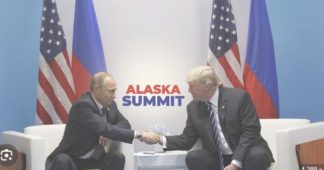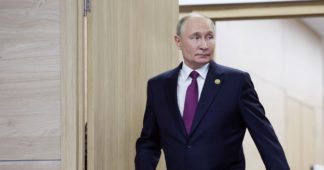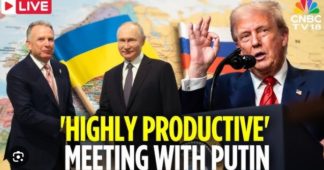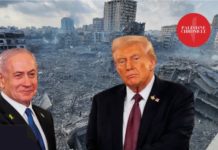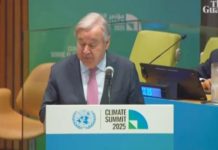By Pascal Lottaz
Aug 16, 2025
The following is the press statements that both leaders gave in Anchorage, Alaska, on August 15, 2025 after their closed-door summit meeting.
Western media—in its solipsistic propaganda fashion—focuses almost exclusively on the words of Donald Trump when reporting on the historical meeting in Alaska between the US and Russian presidents. All the more important it is to get a sense of how Vladimir Putin approached the press conference. Here are the words of both leaders as transcribed from the video attached below. Note 1: It was Putin starting the press conference, speaking for over 8 minutes, while Donald Trump ended his speech in under 4 minutes. Note 2: Both leaders had a cooperative framing of the discussions while implicitly admitting that no concrete outcome had been reached. Note 3: The talks were held under the motto “pursuing peace” not “making peace”.
Vladimir Putin
Mr. President, ladies and gentlemen. Our negotiations have been held in a constructive atmosphere of mutual respect. We had very thorough discussions that were quite useful. I would like to thank, once again, my American counterpart for the proposal to travel out here to Alaska.
It only makes sense that we have met here, because our countries, though separated by the ocean, are close neighbors. When I arrived, I said, “Good afternoon, dear neighbor. Very good to see you in good health, and to see you alive.” I think that is very neighborly, and I believe those are some kind words we can say to each other.
We are separated by the Bering Strait, yet there are two islands—one Russian, one American—only four kilometers apart. We are indeed close neighbors, and that is a fact. It is also important that Alaska represents our common heritage and history, with many positive connections between Russia and the U.S. There is tremendous cultural heritage from Russian America—for example, Orthodox churches and more than 700 geographical names of Russian origin.
During the Second World War, it was here in Alaska that the legendary air bridge began, supplying military aircraft and other equipment under the Lend-Lease program. It was a dangerous and treacherous route over the vast emptiness of ice. However, the pilots of both countries did everything they could to bring victory closer. They risked their lives, and they gave it all for our common triumph.
Recently, I was in the city of Magadan in Russia, where there is a memorial dedicated to both Russian and U.S. pilots. Two flags fly there—the U.S. flag and the Russian flag. I know that here in Alaska, too, there is such a memorial, with a military burial site several kilometers from here, where Soviet pilots are buried who died during that dangerous mission. We are grateful to the citizens and the government of the United States for carefully preserving their memory. That is very worthy and noble.
We will always remember other historical examples when our countries defeated common enemies together in the spirit of battle camaraderie and fellowship. I am sure that this heritage will help us rebuild and foster mutually beneficial and equal ties at this new stage, even under the hardest conditions.
It is well known that there have been no summits between Russia and the U.S. for four years—a long time. Relations have fallen to the lowest point since the Cold War. That benefits neither our countries nor the world as a whole. Sooner or later, we had to amend the situation, to move on from confrontation to dialogue.
In this case, a personal meeting between the heads of state was long overdue. Naturally, this required serious and painstaking work—and this work has been done. President Trump and I have very good, direct contact. We have spoken multiple times, frankly, over the phone. His special envoy, Mr. Witkoff, traveled to Russia several times. Our advisors and foreign ministers kept in touch regularly.
As you know, one of the central issues was the situation around Ukraine. We see the effort of the administration and of President Trump personally to help facilitate a resolution of the conflict, and his determination to get to the crux of the matter, to understand its history. This is precious, because the situation in Ukraine relates to fundamental threats to our security.
Moreover, we have always considered the Ukrainian nation a brotherly nation. However strange it may sound under current conditions, we share the same roots. Everything that is happening is a tragedy for us—a terrible wound. Therefore, Russia is sincerely interested in putting an end to it.
At the same time, we are convinced that in order for the settlement to be lasting, we must eliminate the root causes of the conflict. We have said many times that all legitimate concerns of Russia must be considered, and a just balance of security reinstated in Europe and in the world as a whole. I agree with President Trump, who has said today that naturally, the security of Ukraine should be ensured as well. We are prepared to work on that.
I hope that the agreements we have reached together will help bring us closer to that goal, paving the path towards peace in Ukraine. We expect that Kyiv and European capitals will perceive this constructively, and that they will not throw a wrench into the works, nor attempt provocations to torpedo nascent progress.
Incidentally, since the new administration came to power, bilateral trade has begun to grow. It is still symbolic, but we have seen growth of 20 percent. As I said, there are many dimensions for joint work. U.S.-Russian investment and business cooperation has tremendous potential—in trade, digital technology, high-tech industries, and space exploration. Arctic cooperation is also very possible, particularly between the Russian Far East and the U.S. West Coast.
It is very important for our countries to turn the page and return to cooperation. Symbolically, not far from here, on the border between Russia and the U.S., lies the so-called International Date Line. You can literally step from yesterday into tomorrow. I hope we will succeed in doing that politically as well.
I would like to thank President Trump for our joint work, and for the well-wishing and trustworthy tone of our conversation. It is important that both sides are result-oriented. The President of the U.S. has a very clear idea of what he wants to achieve. He sincerely cares about the prosperity of his nation, and he understands that Russia has its own national interests.
I expect that today’s agreements will be the starting point not only for resolving the Ukrainian issue, but also for bringing back businesslike and pragmatic relations between Russia and the U.S.
In conclusion, I would like to add one more thing. In 2022, during my last contact with the previous administration, I tried to convince my American colleague that the situation should not be brought to the point of no return, leading to hostilities. He accepted directly back then that it was a big mistake.
Today, President Trump has said that if he had been president at that time, there would have been no war. I am quite sure that is true. I can confirm that. I believe that overall, President Trump and I have built a very good, businesslike, and trustworthy contact. We have every reason to believe that by continuing down this path, we can bring the conflict in Ukraine to an end.
Thank you.
Donald Trump
There were many points that we agreed on—most of them, I would say. A couple of big ones we haven’t quite finalized yet, but we have made headway. There is no deal until there is a deal. I will call NATO in a little while. I will call up the various people I think appropriate, and of course President Zelensky, to tell him about today’s meeting.
Ultimately, it is up to them. They have to agree, along with Marco, Steve, and some of the great people from the Trump administration who came here—Scott, John Ratcliffe. Thank you very much. We have some of our really great leaders here, doing a phenomenal job.
We also have tremendous Russian business representatives present, and I think everyone wants to deal with us. We have become the hottest country anywhere in the world in a very short period of time, and we look forward to that. We look forward to dealing. We’re going to try to get this over with.
We made great progress today. I’ve always had a fantastic relationship with President Putin—with Vladimir. We had many tough meetings, but also many good ones.
We were interfered with by the “Russia, Russia, Russia” hoax, which made it tougher to deal with him. But he understood it. I think he has probably seen things like that during the course of his career—he’s seen it all. But we had to put up with the Russia hoax. He knew it was a hoax, and I knew it was a hoax. What was done was very criminal, but it made it harder for us to deal as a country in terms of business and all the other things we wanted to address.
Now, we will have a good chance when this is over. To put it quickly: I’m going to start making a few phone calls to tell people what happened. But it was an extremely productive meeting. Many points were agreed upon, with only a very few left unresolved. Some are not very significant; one is probably the most significant. But we have a very good chance of getting there.
I would like to thank President Putin and his entire team—faces I know in many cases, faces I see all the time in the newspapers. You’re almost as famous as the boss—especially this one right over here. But we have had good, productive meetings over the years, and I hope to have more in the future.
But let’s focus on making this the most productive one yet. We are going to stop five, six, seven thousand people a week from being killed, and President Putin wants that as much as I do.
So again, Mr. President, thank you very much. We’ll speak very soon, and probably see each other again very soon. Thank you very much, Vladimir.
Vladimir Putin: Next time in Moscow
Donald Trump: That’s an interesting one. I might get a little heat on that, but I could see it possibly happening. Thank you very much, Vladimir. And thank you all.
.
We remind our readers that publication of articles on our site does not mean that we agree with what is written. Our policy is to publish anything which we consider of interest, so as to assist our readers in forming their opinions. Sometimes we even publish articles with which we totally disagree, since we believe it is important for our readers to be informed on as wide a spectrum of views as possible.
